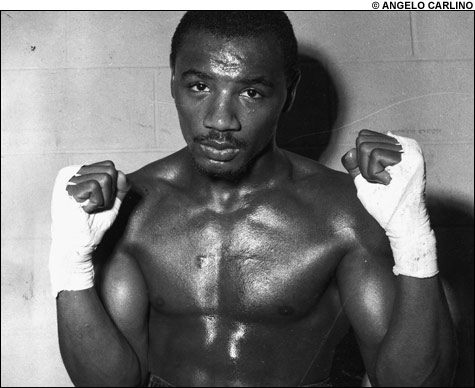
MARVELOUS MARVIN: Hagler’s 1985 bout with Tommy Hearns was one of boxing’s great battles. |
| Four Kings: Leonard, Hagler, Hearns and the Last Great Era of Boxing | By George Kimball | MCBooks Press, Inc | 352 pagess | $22.95 |
At least one passage in Four Kings will get George Kimball cursed out in local bars. The author recounts how he scored the dramatic 1987 fight between Sugar Ray Leonard and Brockton’s Marvin Hagler for Leonard, affirming a decision that has gone down in Boston sports history as a miscarriage of justice. (Covering that fight for the Phoenix, I had it for Leonard also.)However one saw the battle that ended Hagler’s career, it was an unforgettable installment in a series of fights that Kimball says helped “save boxing from itself in the post-Ali era.” The combatants — Hagler, Leonard, Tommy Hearns, and Roberto Durán — all fought one another, in some cases more than once, in a golden era from 1980 to 1989. Hagler-Durán and Leonard-Durán III were nothing special, but Hagler-Leonard and the “No más” Leonard-Durán fight were memorable, and both Leonard’s 14th-round knockout of Hearns in 1981 and Hagler’s third-round stoppage of Hearns in 1985 were among the greatest wars in boxing history.
With boxing in one of its periodic public downturns, Kimball cooks up some compelling nostalgia by recounting an era when great American fighters bestrode the planet. A former Phoenix sportswriter and long-time Boston Herald scribe (and current Phoenix contributor), he knows the game and, more important, the characters who inhabit it.
Unlike, say, Joyce Carol Oates and Norman Mailer — who have brought literary zeal to the “sweet science” — Kimball makes no effort to rhapsodize about boxing’s larger meanings. He offers instead a workmanlike insider’s view of the game that’s meant to comfort us with the thought that though the economic machinations behind the sport are often rancid, the warriors are honorable — at least with fighters of this caliber.
In the meantime, readers get a smorgasbord of fascinating yarns. Kimball recalls how Howard Cosell once had his toupee knocked off in a post-fight interview but soldiered on with the rug replaced backward. In a more serious vein: Boston promoter Sam Silverman, fearful of the more unsavory elements in the sport, used to pay someone to start his car. Then there’s the story of how Hagler and Hearns each got a private jet to fly around the country promoting their 1985 fight. Since one plane was more luxurious than the other, the two men agreed to split time on it. But when Hagler refused to give up his first-class ride, promoter Bob Arum had to get another one exactly like it to keep Hearns from canceling the tour.
What might be Kimball’s most trenchant insight has to do with what happened when Durán quit in the eighth round of his 1980 fight with Leonard, uttering the words, “No más.” Many saw Durán as a coward bailing out against a superior opponent. Kimball, however, posits that Durán wanted to belittle Leonard for being tactical and cute and refusing to mix it up. “My view was that Durán at the time actually believed himself to be committing the ultimate macho act.”